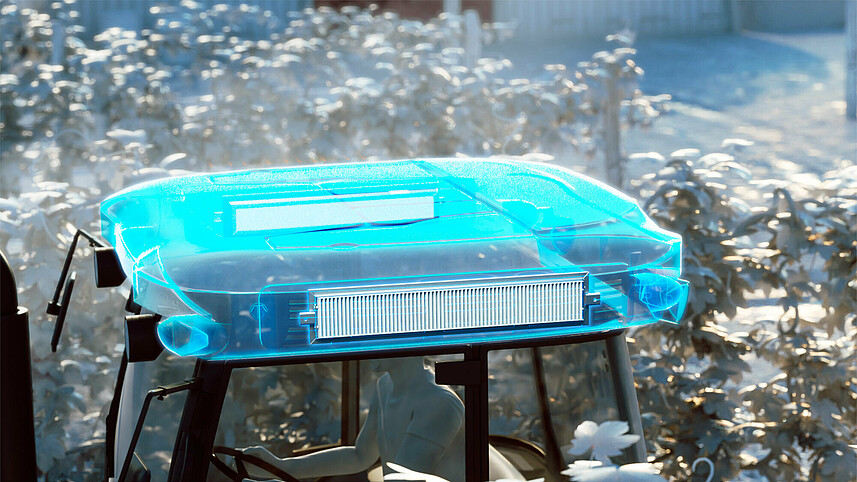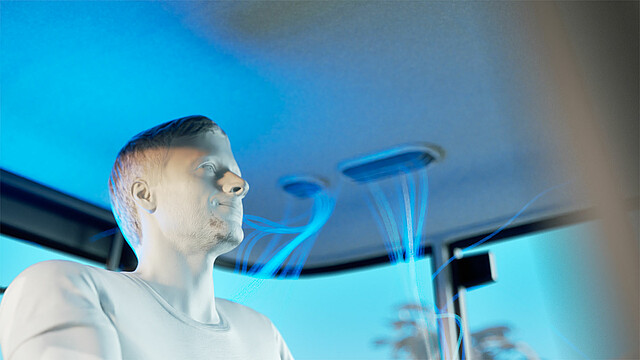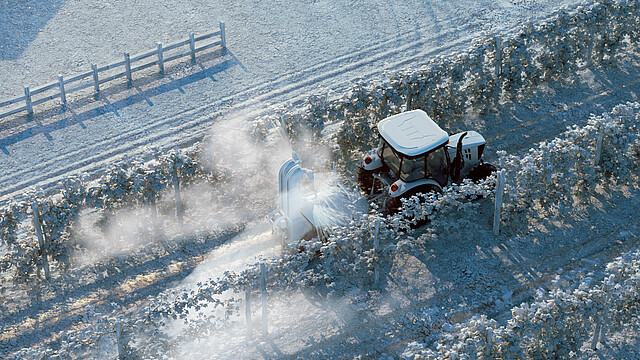Keeping operators safe during spraying season
Freudenberg’s category 4 filtration systems protect agricultural vehicle drivers from toxic pesticides
Spring marks the beginning of the spraying season. While crops need to be protected from weeds, insects, fungi and diseases, agricultural vehicle operators need to be protected from potentially toxic pesticides and liquid fertilizers when working on the fields. Reliably keeping dust, gases, aerosols and vapors out of the cabin is critical for their health and safety.Freudenberg Filtration Technologies offers cabin air filters of all categories to ensure that necessary precautions are taken in keeping with the European norm EN 15695. When applying pesticides, category 4 filters, which offer the highest level of protection, are required.
In the Northern Hemisphere, spring is just around the corner, and usually marks the beginning of planting and spraying crops. Since many agricultural products such as fruits, vegetables and grains need protection from weeds or diseases, pesticides are and will remain a necessity until sustainable and reliable alternatives are available. Agricultural vehicle drivers can be exposed to a potential health risk when spraying pesticides. In Europe, the norm EN 15695 is intended to ensure the purity of cabin air for tractors and self-propelled sprayers used in agriculture and forestry. The goal is to limit the operator’s exposure to hazardous substances when applying plant protection products (PPPs) and liquid fertilizers.
The importance of effective category 4 filtration
EN 15695 includes specific requirements regarding cabin filter classification. It defines four categories – with category 4 offering the best protection. “We recommend that farmers and operators themselves check to see if they are sufficiently protected with their current cabin air filtration solution,” Giacomo Menzio, who is responsible for the agricultural filter product and service portfolio at Freudenberg Filtration Technologies, emphasizes.
Especially when rounding the bend in a field, the cabin can be exposed to a very high concentration of pesticide “fog”; the same is true when the vehicle slows. Moreover, critical situations can arise on windy days, when the pesticide cloud follows or even engulfs the vehicle cabin. “Only a high-quality category 4 filter can provide reliable operator protection in such high-risk situations,” Menzio explains. “However, it must be installed in a properly certified category 4 vehicle cabin.”

Reliable protection from dust, gases, aerosols and vapors
The premium micronAir category 4 cabin air filter from Freudenberg Filtration Technologies is designed with a coordinated multi-stage filter system, which adds a unique, high-performance, activated-carbon layer in the final filter stage. These highly efficient filters, which offer excellent protection from dusts and aerosols, can even block vaporous contaminants that could be extremely harmful to the operator’s health. They are now original standard equipment for the most important agricultural vehicle manufacturers.
“Cabin air filters with activated carbon have been on the market for some time. However, these filters’ status must be carefully and regularly checked in order to truly protect the operator inside the cabin from outside hazards. In many cases the quality of the activated carbon is lacking, or the quantity of activated carbon in the filter may be insufficient to guarantee proper performance,” Menzio adds.
Using the right equipment
In Europe, all new machines are now designed in accordance with the formal standard requirements of EN 15695. To be approved, all filters have to fulfill both the cabin requirements (EN 15695-1) and cabin air filter requirements (EN 15695-2). In order to consistently ensure operator safety inside the cabin, it is essential that the cabin air filter’s performance, quality and certification is examined during maintenance and replacement. To ensure optimal air quality inside the cabin, using original parts and checking the machine’s instruction manual to verify the category of the cabin and filter are recommended.
Freudenberg’s micronAir cabin air filters are tested in accordance with EN 15695 by trusted external institutes. The filter category, depending on the filter application, is indicated on the filter label. After design, development and performance testing, the filter first undergoes the vehicle manufacturer’s internal approval process followed by the machine’s formal approval process.
Regular maintenance and retrofitting older machines
In newer vehicles, a warning appears on the dashboard display when the category 4 filter needs to be replaced. Filter replacements should always be done according to the recommendations in the machine’s instruction manual, and the actual hours of operation should be checked. Generally, filter replacement is recommended at least once a year, usually at the start of the new spraying season.
Basically, every agricultural vehicle cabin can be equipped with the necessary filter and ventilation system. Since agricultural vehicles can only be operated with a closed cabin to ensure adequate protection, upgrading older models with a heating, ventilation, and air conditioning (HVAC) system for additional protection is also recommended. Both the cabin and filter components have to meet the performance requirements of the EN 15695 norm. “Safeguarding operators’ health at their workplace isn’t optional – which is why properly labeled, high-performance filtration and air purification systems are an absolute must, especially at this time of the year,” Menzio concludes.












